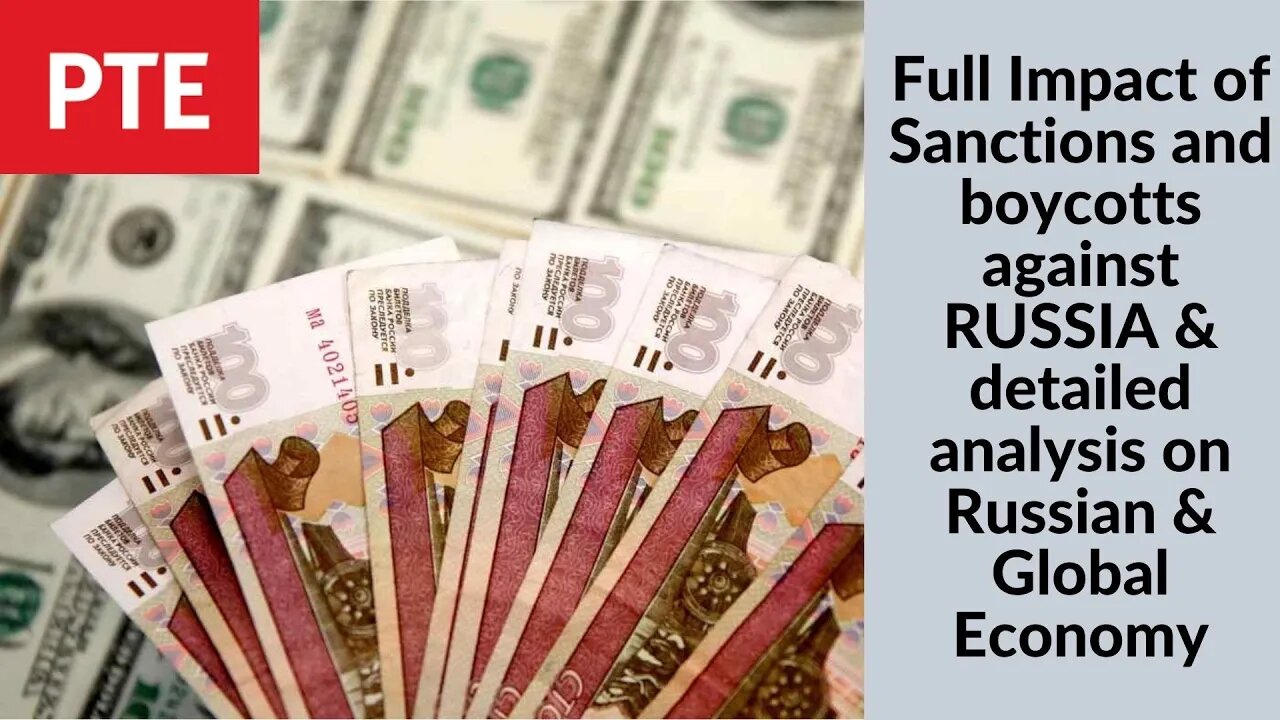Premium Only Content

Impact of Sanctions & boycotts against Russia & detailed analysis, why it will affect Global Economy
Patreon and donations:
http://www.patreon.com/kouturemag
buymeacoffee:
https://www.ko-fi.com/kouturemag (paypal)
https://paypal.me/kouturemag?country.x=GB&locale.x=en_GB
BITCOIN CRYPTO: 39Jb8UduBSEhGjQbDH8gRYALTQT9Fo8HiB
Social media:
www.tiktok.com/@kouturemag
Reddit: r/PTE_PoliticsTechEco
https://www.twitter.com/kouturemag
https://www.instagram.com/kouturemag
https://www.facebook.com/KoutureMag
Banks across Japan, the U.S. and Europe are staring down potentially big losses from their Russian operations, as sanctions and an exodus of global companies dim the prospects of recouping a combined $150 billion in debt owed by the country and businesses.
"Our loans in Russia essentially are in default," said an executive at one of Japan's megabanks.
The company that built the new Nord Stream 2 gas pipeline connecting Germany and Russia is considering filing for insolvency, Reuters reported. Though construction has been completed, Germany said it will not certify the project for commercial operations.
Financing agreements for such projects often include a force majeure clause, granting temporary relief in extraordinary circumstances like war or economic sanctions. This means debtors rarely default as long as their projects remain in operation. But the projects themselves could fail if countries like the U.S. or Japan impose new Russia sanctions that interfere with their services.
In addition to the three Japanese megabanks -- Mitsubishi UFJ Financial Group, Sumitomo Mitsui Financial Group and Mizuho Financial Group -- the state-run Japan Bank for International Cooperation also provides financing for projects in Russia. They were involved in the Nord Stream 1 pipeline in the past. The Amur Gas Chemical Complex, slated for completion in the Russian Far East during 2024, is also believed to be partly Japanese-financed.
Neither of these projects has been targeted by sanctions so far. But their revenue could dry up if core participants withdraw. Exxon Mobil and Shell have said they will exit the Sakhalin-1 and Sakhalin-2 oil and gas projects, respectively, in Russia.
European banks are the largest lenders to Russia, according to the Bank for International Settlements. France topped the list with $32.6 billion in outstanding claims as of the end of September, followed by Italy with $30.9 billion. Austria had $22.7 billion in claims. By institution, Russia represents 9% of groupwide exposure at Austria's Raiffeisen Bank International, as well as 1.7% for France's Societe Generale and 1.6% of Italy's UniCredit.
-
 2:00:10
2:00:10
PTE Geopolitics "World in Flames"
1 year agoLIVE CHAT: Lets talk gaza , hostages released, VW loses in China, EU panicking over Trump Ukraine
6592 -
 LIVE
LIVE
GritsGG
2 hours ago#1 Most Warzone Wins 4000+!
112 watching -
 41:54
41:54
Nicholas Bowling
4 hours agoWhile Preaching to Muslims, EX-MUSLIM Shares Why He Left Islam (London, UK)
39 -
 LIVE
LIVE
bucketofish
1 hour agoNoise Floor \\ Behind the Mix - Ep 002 - Wide Awake by Katy Perry
63 watching -
 LIVE
LIVE
Biscotti-B23
1 hour ago🔴 LIVE DISPATCH PLAYTHROUGH & PARTY GAMES
219 watching -
 LIVE
LIVE
Lofi Girl
2 years agoSynthwave Radio 🌌 - beats to chill/game to
94 watching -
 LIVE
LIVE
LumpyPotatoX2
3 hours agoHostile Takeover | High-Stakes PvP - #RumbleGaming
120 watching -
 2:07:50
2:07:50
LadyDesireeMusic
3 hours ago $17.77 earnedCooking Stream | Make Ladies Great Again
45.4K5 -
 2:03:42
2:03:42
The Connect: With Johnny Mitchell
1 day ago $27.90 earnedAmerican Vigilante Reveals How He Went To WAR Against The WORST Cartels In Mexico
118K13 -
 LIVE
LIVE
a12cat34dog
4 hours agoONE OF THE BEST REMAKES EVER :: Resident Evil 4 (2023) :: I GOT 100% ON EVERYTHING {18+}
88 watching